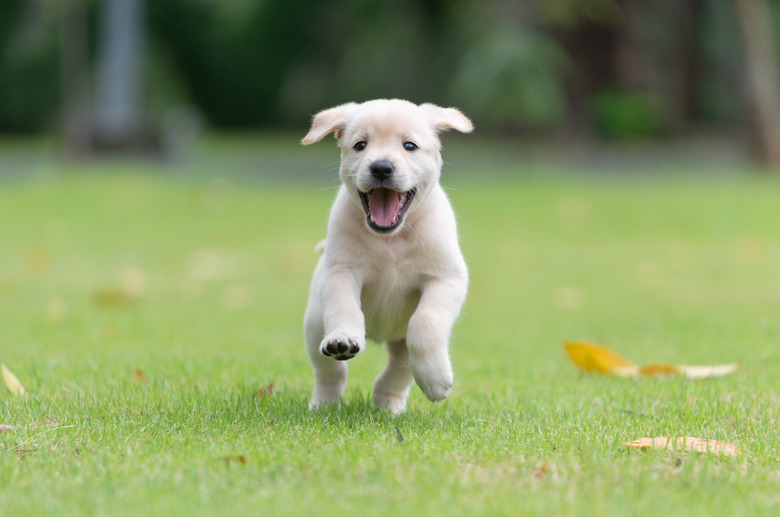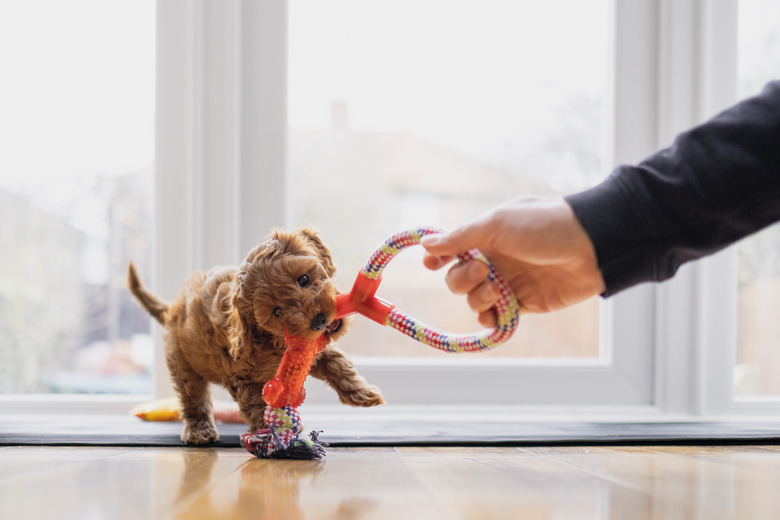How Much Exercise Does A Puppy Need?
A new puppy is naturally high energy so the idea of giving them extra physical activity in the form of exercise sessions might seem unnecessary. But a puppy needs movement to develop their muscles and tire them out so they sleep well — they just need a lot less exercise than a full-size dog.
Exercise routines for a puppy
Exercise routines for a puppy
Exercise has a connotation of something many people do out of necessity, not because it's fun. But when you're trying to incorporate physical activity for a puppy, there are many fun options that won't feel like a chore.
The Kennel Club explains that puppies need much less exercise than fully grown dogs. This is partly because too much of an exercise routine can damage their developing joints or put too much stress on their small body. A good rule of thumb is a ratio of five minutes of exercise per month of age up to twice a day until the puppy is fully grown. So for example, at 4 months of age, a new puppy needs 20 minutes of activity up to twice a day until they are fully grown, at which time they can exercise for much longer.
How to exercise a puppy
How to exercise a puppy
Before your pup is fully vaccinated, get creative with exercise in your yard or inside your home. The American Kennel Club recommends fun games like tug-of-war and hide-and-seek. You can also hide treats around your yard, and help your puppy look for them. The possibilities are endless—the exercise should be mild and fun, and should not leave your puppy exhausted at the end. Any activity you can think of that fits those criteria is fair game!
Once they are fully vaccinated, take short walks with your puppy to develop their muscles and endurance for long walks later. These walks should be short, and again should not leave your puppy exhausted. Use them in addition to yard or indoor play until your puppy has built up more endurance for longer walks.
Choose multiple exercise sessions
Choose multiple exercise sessions
Over-exercising is just as bad as a new puppy not getting any exercise at all, because overexercising can cause joint and bone problems. There aren't any clear studies on just how much activity is good, better, or best for a new puppy, but in general there are a few good guidelines. If your puppy is a breed with endurance, such as a border collie, they'll probably appreciate a longer playtime. Other things to keep in mind are their coat length and thickness — a small short-haired breed will likely get cold after being outdoors in cold weather for more than a few minutes.
Large breed dogs, who can already have joint problems, should avoid exercise activities like jumping until they are fully grown. Small breeds reach their full size more quickly, but they also need to eat more frequently and may need more frequent rests. Consider more frequent, shorter exercise sessions with a growing puppy rather than choosing between long walks versus short walks. A new puppy will need plenty of time for rest in between play sessions. Don't give your new puppy a workout on a full stomach, as this can contribute to bloat.
Exercise helps curb destructive behaviors
Exercise helps curb destructive behaviors
While a lot of dogs grow into couch-lovers, physical activity is a key component of healthy development and weight maintenance at any age. Giving a high energy new puppy a regular amount of exercise can help to keep your dog from turning their high energy into destructive behaviors like excess chewing or licking out of boredom.
Let your puppy lead on when they seem ready to stop so your puppy learns to self-regulate. You can encourage breaks by offering water or petting and praise sessions. If your puppy flops down next to you after a few minutes of playtime, go ahead and give them a break. Healthy exercise sessions for your puppy can include walks and interactive play, such as hiding a treat in a toy.
The bottom line
The bottom line
A puppy needs a certain number of minutes of exercise per day to keep their energy levels in check and stave off boredom. The amount of exercise they need varies by large breed or small breed, but generally speaking a new puppy needs five minutes of exercise per month of age up to twice a day, until the puppy is fully grown. Too much exercise before they are fully grown can damage their developing joints.
Always check with your veterinarian before changing your pet's diet, medication, or physical activity routines. This information is not a substitute for a vet's opinion.


